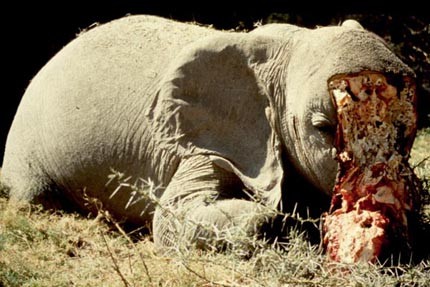Congo : massacre des éléphants par les braconniers pour l'ivoire

By Joe Bavier
KINSHASA (Reuters) - Poachers in Congo have killed a fifth of the elephants in Africa's oldest national park this year as China buys more ivory, the park's director said on Friday.
Rwandan rebels have killed seven Savannah elephants in the past 10 days alone in the Virunga National Park, along Congo's eastern border with Rwanda and Uganda, Emmanuel de Merode told Reuters.
"We've definitely lost 20 percent of the population this year and probably more," he said. "We have rangers with them, and we're trying to reinforce them. But (the rangers) are outnumbered 20 to one."
The 790,000-hectare (2 million-acre) reserve was home to one of central Africa's largest Savannah elephant herds in the 1970s numbering around 5,000.
But a brutal 1998-2003 war, heavy poaching, corruption and mismanagement of the park have taken a heavy toll. Today conservationists believe no more than 300 elephants remain.
China, among the world's main destinations for illegal ivory, was granted permission last month to buy 108 tonnes of ivory stocks from Botswana, Namibia, South Africa and Zimbabwe by the Convention on International Trade in Endangered Species.
De Merode singled out China's growing appetite for ivory as one of the root causes of this year's increase in elephant killings, as poachers attempt to launder their illegal ivory for legitimate sale.
"It's very difficult to distinguish between legal and illegal stocks," he said.
Despite the official end of the conflict in Congo, the eastern borderlands remain a volatile patchwork of rebel strongholds and militia controlled zones.
Armed clashes between rival armed groups are a regular occurrence, limiting the rangers' ability to patrol, and providing cover for poaching.
The Savannah elephant is a sub-species of the African elephant, which is classified as a vulnerable species by the International Union for Conservation of Nature and Natural Resources.
(Editing by Alistair Thomson/Tony Austin)
© Thomson Reuters 2008 All rights reserved
http://www.reuters.com/article/environmentNews/idUSLM40286220080822?sp=true